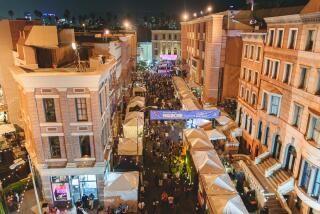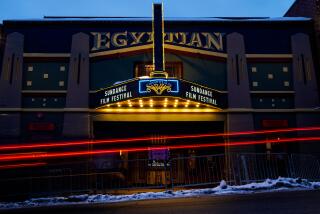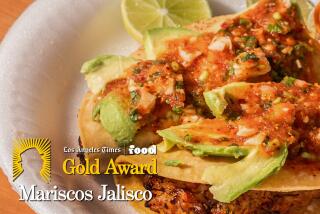Sundance 2015: ‘City of Gold’ documents eclectic Times critic Jonathan Gold
Like other big cities, Los Angeles has accumulated a string of nicknames over the years.
Add a new one to the list: “City of Gold.”
That’s the name of a new documentary about Los Angeles Times restaurant critic Jonathan Gold. The film takes viewers on a cinematic journey with Gold as he scours the city and its anonymous strip malls for undiscovered gems, looking for what he calls “a thereness beneath the thereness.”
FULL COVERAGE: Sundance Film Festival
The critic, who one year attempted to eat at every restaurant on Pico Boulevard, puts an estimated 20,000 miles on his green Dodge pickup truck annually. To keep up, the film uses aerial photography shot with a drone to connect what Gold calls “the glorious mosaic of the city.”
Gold, who won the 2007 Pulitzer Prize for criticism while working for the L.A. Weekly, is best known for championing small restaurants that most critics never visit. He is the food-writing equivalent of Raymond Chandler, someone who creates his own particular way of looking at the city, journalist Allen Salkin says in the film. In an understated sense, “City of Gold” is also an argument not just for Gold’s significance but for the importance of criticism as a whole.
At the climax of the film, he reads from a piece written after the 1992 L.A. riots in which he offers a melancholy celebration of a city where Spanish mothers and Salvadoran teenagers and Korean landlords live cheek-by-jowl with Anglo journalists who, even if they don’t share viewpoints or even speak one another’s languages, can always sit down at the same table.
After the Sundance screening, a woman in the audience stood up and proclaimed “City of Gold” a more powerful statement on race and culture than any of the festival’s more overtly issue-oriented documentaries.
Sundance Selects, which is owned by AMC Networks and is a sister label to IFC Films, announced Wednesday that it had acquired the North American distribution rights to “City of Gold.”
The deal was another step in the journey for “City of Gold” director Laura Gabbert. She said she has been reading Gold for 20 years, following his Counter Intelligence column from The Times to L.A. Weekly and back to The Times in 2012.
Along the way, the UCLA grad student who thought she would hate L.A. became an Angeleno who learned to explore the city, with Gold as her guide.
“I just started checking out all these different places, going to the San Gabriel Valley or some place we’d never been, and trying the food,” Gabbert said. “It was kind of a way to get to know Los Angeles. You start to see L.A. through his eyes.”
Gold isn’t averse to established greats or high-end dining; he named Spago the city’s best restaurant last year and admits that when he was covering the nation’s fanciest eateries for Gourmet, “a lot of that food was great.” But Gold, who can be seen in the film playing cello in a punk band called Overman, grew tired of chronicling “the amusements of the rich.” He fondly recalled the days when Ruth Reichl was The Times’ lead food critic and he was second fiddle. “On nights when she was stuck in West Hollywood reviewing the 13th-most-interesting Italian restaurant in town, I was having my mind absolutely freaking blown by someone who was doing Shanxi-style hand-shaved noodles.”
The day before the film’s premiere in Park City, Gold said he didn’t see writing about food as that different from writing about anything else.
“To me, the important thing is locating the cuisine or the restaurant or the chef within the context of the culture,” he said in an interview. “You have to know about food, and you have to have the tools to evaluate it, but I don’t think it’s any more consumer criticism than when an art critic reviews an art show.”
Restaurateurs may disagree: No film critic has the power to single-handedly shut down a studio stinker, but a scathing review from a particular food critic can close a restaurant, just as a rave can secure its future. Although Gold fondly recalls trashing the work of a New York chef whose trendy twists included a topping of grated Altoids, he’d much rather advocate for the little guys, the mom-and-pops whose regionally specific cuisine — Gold dislikes the word “ethnic” — flourishes in greater Los Angeles’ sprawl of diverse neighborhoods. Here, he says, you don’t eat Mexican food but, rather, Oaxacan or Sinaloan. L.A.’s signature dish, Gold says, is not the California roll but the Thai blood soup at Night + Market Song in Silver Lake.
“It’s really off-putting,” he says, “but when people eat it, it brings them to a place that they probably wouldn’t have gone if they’d just gone there and had a plate of noodles.”
Although Gold initially told Gabbert that making a documentary about him was “a terrible idea,” the early response has confirmed the director’s belief in her subject’s point of view.
“You see L.A. as this big sprawl of ugly mini-malls,” Gabbert said. “But then it starts to get to you, and you start seeing the beauty there. I fell in love with the city. And I really credit Jonathan.”
“City of Gold” got a standing ovation at its Sundance premiere this week. And that was before Gold announced that there would be free tacos in the parking lot.
More to Read
Only good movies
Get the Indie Focus newsletter, Mark Olsen's weekly guide to the world of cinema.
You may occasionally receive promotional content from the Los Angeles Times.










